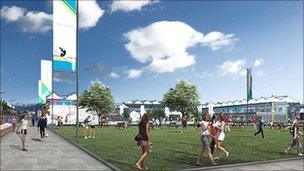Transport plan for 2014 Commonwealth Games unveiled
- Published

Plans include a core route network to transport athletes between the athletes' village and venues
Organisers of the 2014 Commonwealth Games have unveiled transport plans which they claim will leave a lasting legacy for the host city of Glasgow.
The document details how organisers hope to keep athletes, spectators and staff moving during the event.
The plans include a core route network of dedicated lanes on existing roads to transport athletes between the athletes' village and venues.
Thousands of extra people are expected to flood into Glasgow for the event.
Under the plans, the 4,500 athletes taking part will travel along the core route network in minibuses or coaches and will use the dedicated lanes where necessary. They will also be given priority over other traffic in a similar way to buses in bus lanes.
These lanes will form part of a larger dedicated games route network that will also be used by people working on the event.
After the Games, most of the 20km (12.4 miles) that forms the core route network will be transformed into priority bus lanes.
'Paramount importance'
Organisers said they were committed to developing a service that was efficient and frequent, and promoted sustainable modes of transport.
Glasgow 2014 chief executive John Scott said: "Ensuring that Glasgow, as the host city, gets star athletes like Chris Hoy and Usain Bolt where they need to be at the right time in order to train and compete is of paramount importance.
"Not only will we be fulfilling a critical role to deliver an outstanding games, but we are using the investment to deliver a lasting and permanent legacy for the people of Glasgow."
Organisers said that other permanent improvements would include new bus shelters, improved information and signage along the routes and better public safety through additional CCTV.
The transport plan is open for public consultation until 25 March next year and can be downloaded from the Glasgow 2014 web site, or viewed in printed form at libraries and other council premises across Glasgow.
It is the first of three versions of the transport plan. Each plan will evolve from the previous one and the final version will be published the year before the Games.
- Published23 August 2010
- Published12 July 2010